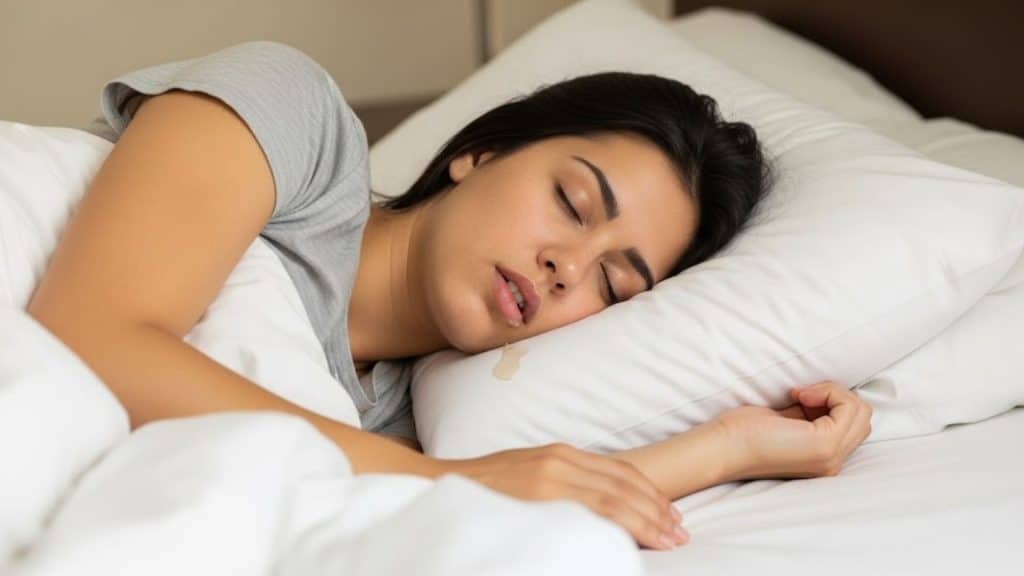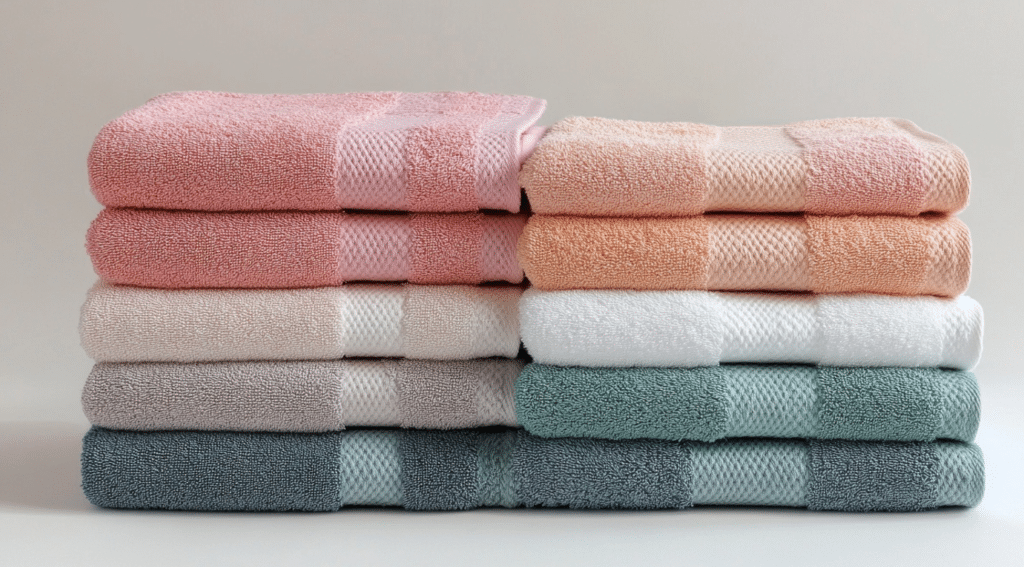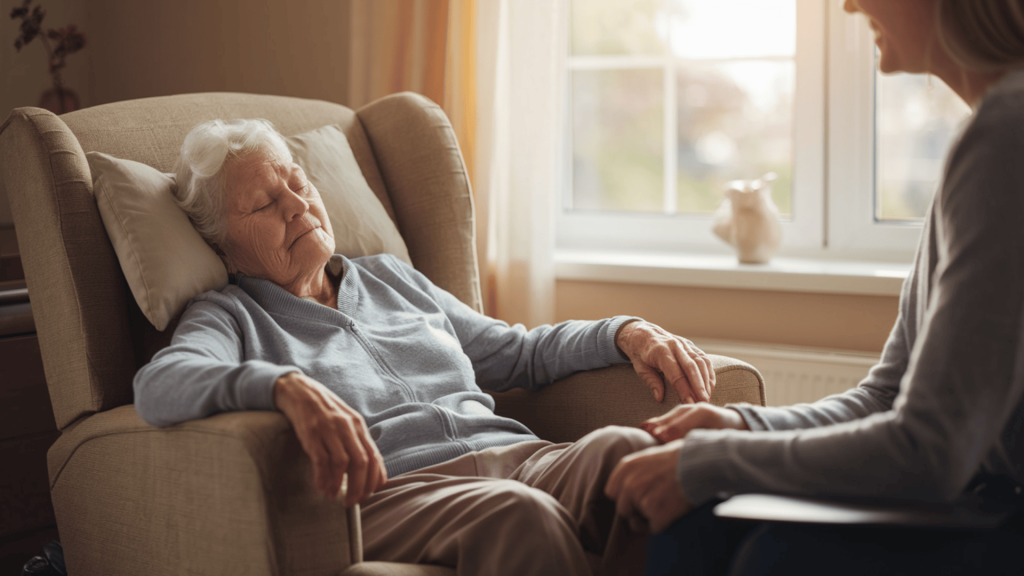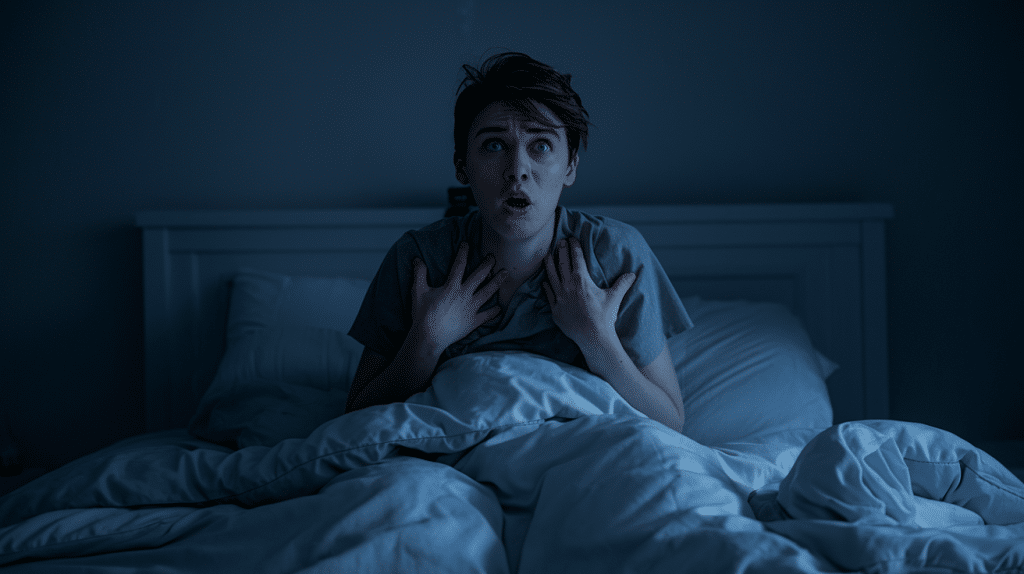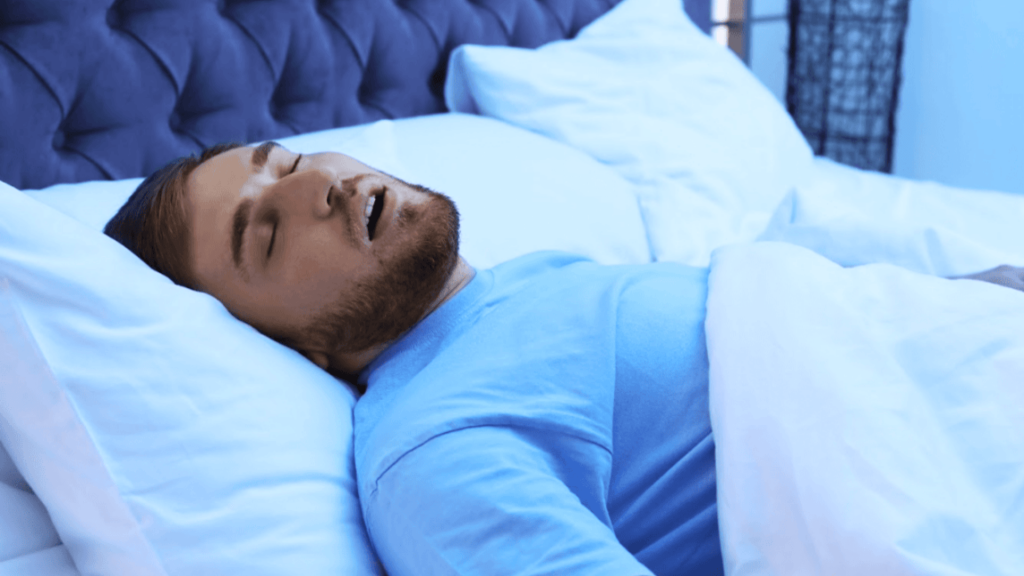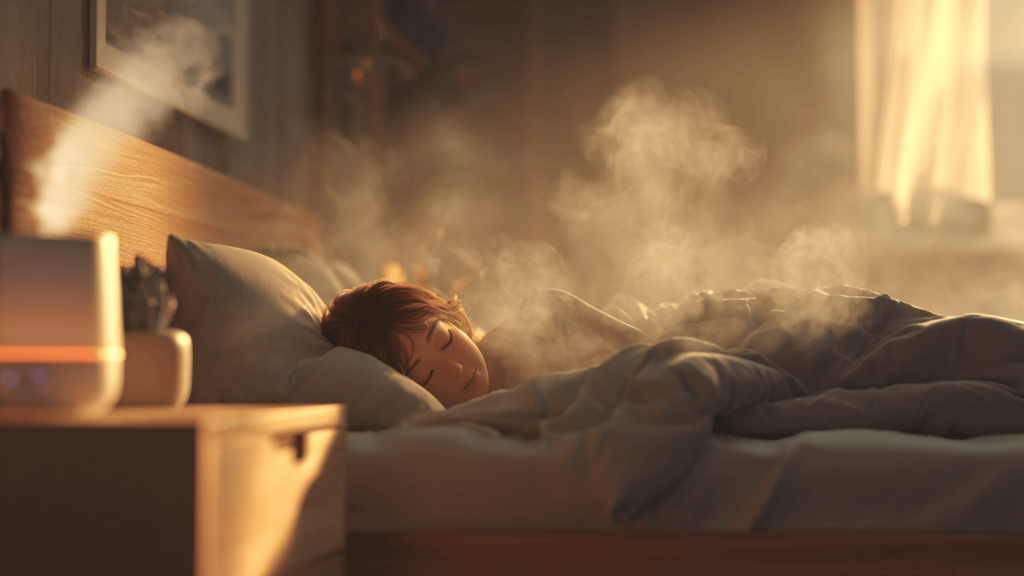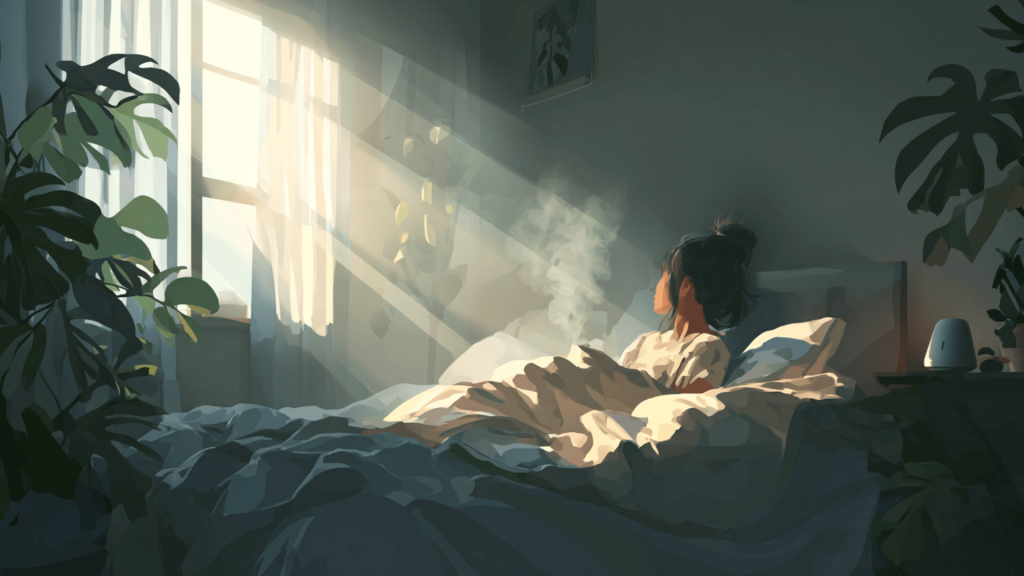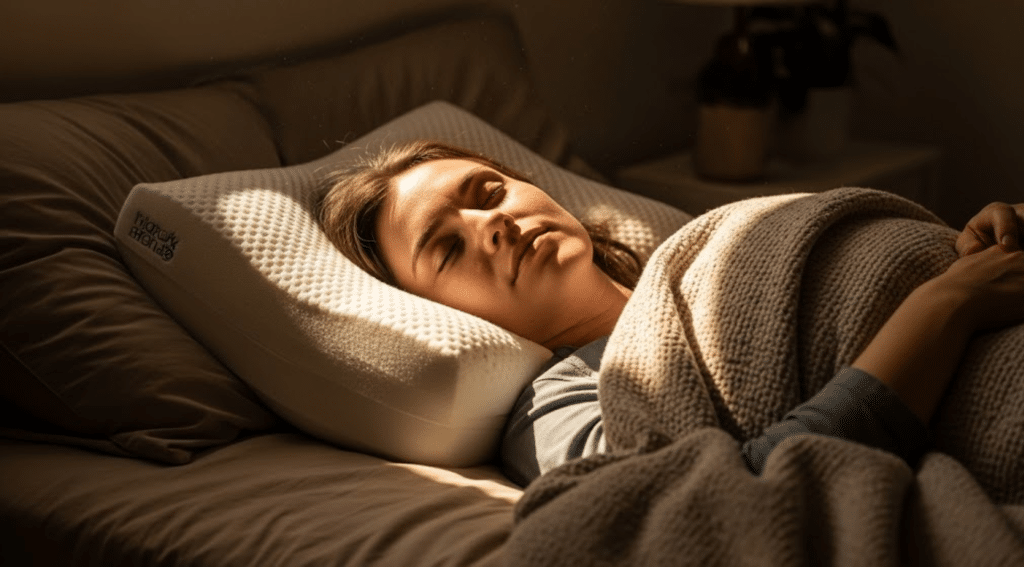Ever woken up to a damp pillow and wondered what the heck’s going on? I’ve had that happen, and let me tell you, it’s not the best way to start the day.
Drooling in your sleep might feel a little awkward, but you’re definitely not alone. It’s more common than most people realize, and in most cases, it’s nothing serious.
Still, I get how annoying it can be, especially if it keeps happening night after night.
Today, I’ll tell you what causes nighttime drooling, things like your sleep position, allergies, even stress, or medications. I’ll also walk you through a few simple ways I’ve found that actually help stop it, so you can wake up dry and feel more comfortable.
Is It Normal to Drool While Sleeping?
Drooling while you sleep is completely normal and happens to most people at some point during their lives. Your mouth naturally produces saliva throughout the night to keep your throat moist and protect your teeth from bacteria.
Children drool more often because their swallowing reflexes are still developing, and they often breathe through their mouths. People with allergies or stuffy noses also drool more, as blocked airways force them to sleep with their mouths open.
Your sleeping position plays a big role in how much you drool during the night. Side sleepers and stomach sleepers tend to experience more drooling than back sleepers due to the effects of gravity.
Still wondering how to stop drooling in your sleep? Try sleeping on your back, treating nasal congestion, and talking to a doctor if it happens often.
Excessive drooling every night might signal underlying health conditions that need medical attention and evaluation from healthcare professionals.
Why Do I Drool when I Sleep?
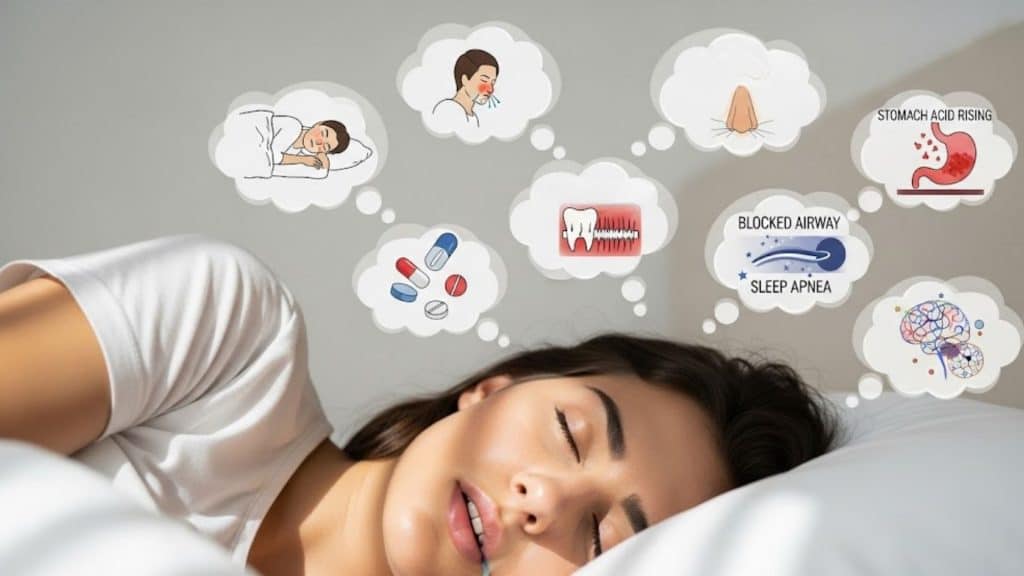
I understand how embarrassing it can feel to wake up with a wet pillow every morning. You’ll be surprised to learn that several common factors can trigger excessive saliva flow during your sleep hours.
1. Sleeping Position
When you sleep on your side or stomach, gravity naturally pulls saliva out of your mouth onto your pillow. Your mouth tends to fall open in these positions, creating a clear path for drool to escape.
Back sleeping keeps your mouth more closed, and saliva flows down your throat instead. Side sleepers experience the most drooling because one side of their mouth is constantly facing downward throughout the night. Stomach sleeping also allows saliva to pool and leak out easily during deep sleep phases.
2. Nasal Congestion
Blocked sinuses from allergies, colds, or sinus infections force you to breathe through your mouth while sleeping. When your nose is stuffy, your mouth stays open all night to get enough air. This open-mouth breathing allows saliva to flow out instead of being swallowed naturally, as it normally would.
Seasonal allergies can cause chronic congestion, leading to frequent drooling episodes during sleep. Even minor nasal blockages can trigger mouth breathing and subsequent drooling throughout the night.
3. GERD (Gastroesophageal Reflux Disease)
Acid reflux causes your body to produce extra saliva as a natural defense against stomach acid. When acid travels up your esophagus, your salivary glands work overtime to neutralize the harsh chemicals.
This increased saliva production often overwhelms your ability to swallow it all while sleeping. The excess saliva has nowhere to go except out of your mouth onto your pillow. GERD symptoms typically worsen when lying flat, making nighttime drooling more common for reflux sufferers.
4. Sleep Apnea
Sleep apnea disrupts normal breathing patterns, forcing you to breathe through your mouth during sleep episodes. When your airway becomes blocked, you instinctively open your mouth to gasp for air throughout the night.
The repeated breathing interruptions prevent normal swallowing reflexes from working properly while you sleep. Sleep apnea patients often wake up with extremely wet pillows from excessive nighttime drooling.
5. Bruxism (Teeth Grinding)
Teeth grinding creates jaw tension that affects your mouth’s natural resting position during sleep hours. The grinding motion stimulates your salivary glands to produce more saliva as a protective response. Your jaw muscles become fatigued from grinding, causing your mouth to fall open more easily.
This combination of increased saliva production and open mouth positioning leads to more frequent drooling episodes. Bruxism also forces many people to breathe through their mouths, adding another layer to the drooling problem.
6. Neurological Conditions
Conditions like Parkinson’s disease, stroke, or cerebral palsy affect the muscles that control swallowing and mouth closure. These disorders can weaken the facial muscles responsible for keeping your mouth closed during sleep. Damaged nerves may not send proper signals to coordinate swallowing reflexes effectively throughout the night.
Brain injuries can disrupt the automatic processes that normally prevent saliva from escaping your mouth. Progressive neurological diseases often worsen drooling symptoms as muscle control continues to decline over time.
7. Medications
Certain medications, including antipsychotics, antidepressants, and Alzheimer’s drugs, can increase saliva production as a side effect. These medications may also affect the muscles that control swallowing and mouth closure during sleep.
Muscle relaxants can make it harder to keep your mouth closed throughout the entire night. Multiple medications taken together often compound these effects, leading to more severe drooling problems.
How to Stop Drooling in Your Sleep
Managing nighttime drooling doesn’t have to be complicated or expensive with the right approach. These proven strategies can help you wake up with a dry pillow and better sleep quality.
- Change your sleeping position: Sleep on your back instead of your side or stomach to allow saliva to flow naturally down your throat, rather than out of your mouth.
- Treat nasal congestion: Use antihistamines, nasal strips, or decongestants to clear blocked sinuses and reduce mouth breathing, which can lead to excessive drooling.
- Avoid acidic or sugary foods: Stay away from citrus fruits, candy, and acidic drinks before bedtime, since these foods stimulate your salivary glands to produce more saliva.
- Adjust your diet and hydration: Avoid acidic and sugary foods before bed that increase saliva production while staying properly hydrated throughout the day.
- Try mouth taping carefully: Consider a gentle mouth tape designed for sleep as a last resort to keep your mouth closed, but consult a doctor first.
Most people see improvements within just a few nights of trying these simple techniques consistently. You can combine several methods together for even better results and more comfortable sleep.
When to See a Doctor

Most nighttime drooling is harmless, but certain warning signs mean you should schedule an appointment with your healthcare provider soon. Visit your doctor if drooling suddenly worsens or begins to occur when it has never done so before.
You should also seek medical help if drooling accompanies loud snoring, choking sounds, or excessive daytime tiredness, as these may indicate sleep apnea.
Difficulty swallowing food or drinks, muscle weakness, or trouble controlling facial movements may signal serious neurological conditions that require immediate attention.
Your doctor might recommend treatments like Botox injections, special medications, or even surgery for severe cases that interfere with your daily life.
Don’t hesitate to consult a specialist if drooling significantly affects your confidence, relationships, or sleep quality.
Potential Complications of Drooling
While drooling itself isn’t dangerous, ignoring chronic drooling can lead to uncomfortable and sometimes serious health problems. I want you to understand these potential complications so you can take action before they affect your well-being.
- Skin irritation and chapping: Constant moisture around your mouth and chin can cause painful rashes, chapped lips, and cracked skin.
- Dehydration risks: Excessive saliva loss every night can lead to dehydration, especially if you don’t drink enough water daily.
- Aspiration pneumonia danger: Accidentally inhaling saliva into your lungs while sleeping can lead to serious infections that require immediate medical treatment.
- Social and emotional impact: Chronic drooling can make you feel embarrassed about sleepovers, relationships, or sharing beds with others.
Most of these complications are entirely preventable with proper treatment and lifestyle changes that address the root cause. You don’t have to live with these problems when simple solutions can protect your health and comfort.
Wrapping It Up
Drooling in sleep can be embarrassing, but you’re not alone in this common nighttime struggle that affects countless people worldwide. I hope you now understand that most causes stem from everyday factors, such as poor sleeping positions, blocked noses, or certain medications, rather than serious health problems.
Take heart knowing that simple changes, such as sleeping on your back, clearing nasal congestion, and adjusting your diet, can lead to dramatic improvements within just a few nights.
Don’t let pride prevent you from seeking medical help if drooling becomes severe or significantly affects your quality of life.

